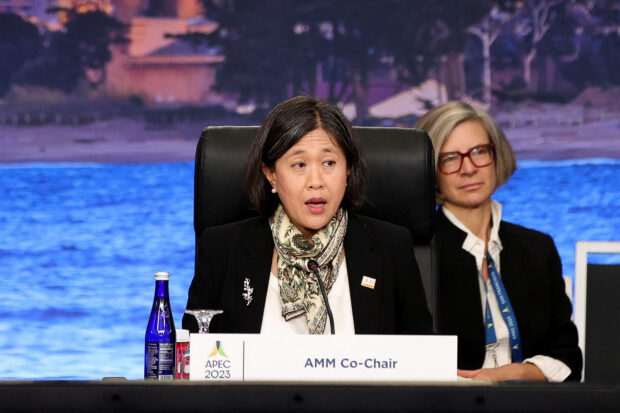China objects to US bid for APEC to shift trade, investment principles

U.S. Trade Representative Ambassador Katherine Tai speaks during an APEC Ministerial Meeting Opening Session in San Francisco, California, U.S., Nov 15, 2023. REUTERS/Brittany Hosea-Small
SAN FRANCISCO -China is objecting to a U.S. proposal for Asia Pacific Economic Cooperation (APEC) members to incorporate sustainability and inclusivity into their trade and investment policies, a source briefed on the negotiations said on Wednesday.
Talks on the issue were continuing at the APEC summit in San Francisco to try to find language that the group’s 21 member states could agree on, the source said.
U.S. Trade Representative Katherine Tai told a trade-focused plenary meeting she hoped the proposal, dubbed by the Biden administration as the “San Francisco Principles for Integrating Inclusivity and Sustainability into Trade and Investment Policy” could be still be finalized.
Tai said the U.S.-led effort was “supported by all economies but one and, as such, it is unclear if APEC will fulfill that mandate. Nonetheless, I remain optimistic that economies will finalize the San Francisco Principles soon.”
Few details of the U.S. proposal were available, but the Biden administration is promoting the idea that APEC economies increase opportunities for more people, particularly disadvantaged populations, and to incorporate clean energy and carbon emissions reductions goals into their development, growth and trade policies.
“Our economies are more than just numbers,” Tai said when describing the U.S. proposal. “They are made of people, so we need to make sure that our economic and trade policies work for our people and that the benefits created are shared by all.”
READ: Apec growth seen to slow as stubborn inflation, US-China tensions weigh
Tai is separately seeking to negotiate a green steel arrangement with the European Union that aims to disadvantage Chinese steelmakers on the basis of their higher carbon emissions.
News of China’s objections at the APEC summit come as U.S. President Joe Biden and Chinese President Xi Jinping met south of San Francisco in high-stakes talks that included discussions between the superpowers over Taiwan and the Israel-Hamas war in Gaza.
READ: What to expect when Joe Biden meets Xi Jinping in San Francisco
A spokesperson for China’s embassy in Washington did not directly address China’s objections but said that all APEC parties should “focus on the region’s urgent needs, deepen solidarity and cooperation, deliver on the APEC Putrajaya Vision 2040 in an all-round and balanced way,” a reference to declarations by APEC leaders in 2020 in Malaysia.
The Putrajaya vision called for working to “deliver a free, open, fair, non-discriminatory, transparent and predictable trade and investment environment.”